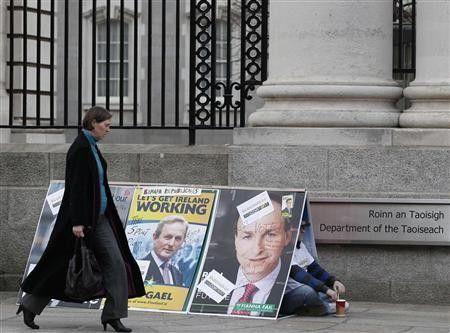Indebted Irish take revenge in crisis poll

Irish voters went to the polls on Friday to punish their government for bringing the former Celtic Tiger economy to its knees and leaving it a ward of the European Union and International Monetary Fund.
The ruling Fianna Fail party is set to be the first political victim of Europe's debt crisis with opinion polls suggesting the giant of Irish politics will be reduced to a rump amid voter anger over the economic meltdown.
In the biggest political shake-up since Ireland won independence from Britain in 1921, Enda Kenny's centre-right Fine Gael party is expected to win, possibly with an outright majority for the first time.
This government have shamed us, the whole country is shamed by them, said Alan Pinder, 49, a plumber. They need to be punished.
Ireland's transformation from economic pin-up to euro zone struggler on the back of reckless property lending has angered the 3 million plus electorate but overall their instincts remain conservative.
Like Fianna Fail, Fine Gael has a pro-business and low-tax ideology and has pledged to stick to the overall austerity targets laid down by the EU and IMF as a condition of an 85 billion euros bailout package agreed in December.
But Fine Gael is less tainted by the allegations of crony capitalism that dogged Fianna Fail. Polls show it could win nearly 80 seats, putting it within reach of forming a single-party administration.
A minority Fine Gael government would need the support of independents and for the sake of stability, most analysts expect Kenny will form a coalition with the centre-left Labour party to navigate the EU/IMF programme.
FUTURE CUTS
Polls suggest Fianna Fail will retain around 20 seats in the 166-seat chamber, and possibly win just one in the capital, Dublin, ending its dominant position.
Such a slide from the 78 seats it held after the 2007 election would mark the sharpest collapse of support for any Irish party in history and would be a humiliation for a party which has run Ireland for 61 of the past 79 years.
Liam Wells, a bricklayer, has little sympathy. Like many Irish people he is struggling to pay off a large mortgage and fearful of how he will afford future austerity measures.
I never thought I'd see the day that I'd be refereeing soccer matches at the weekend just to make ends meet, said the father of two.
I don't mind paying to help my country to get out of the mess but there is only so much ordinary people can pay.
Keen to mine public discontent over what is seen as a punishing bailout deal, both Fine Gael and Labour have campaigned for a mandate to renegotiate its terms.
But in trading rooms across the euro zone and on the streets of Dublin, people are sceptical about how far they will push European partners, given Ireland's dependence on European Central Bank (ECB) support to keep its banking sector alive.
While Ireland's borrowing costs may be reduced as part of a wider EU agreement on resolving the debt crisis next month, Dublin is unlikely to receive a green light to impose losses on some senior bondholders in Irish banks due to ECB opposition.
Financial markets have priced in that Fine Gael, led by former teacher Kenny, will be swept into office, but they are watching to see how big a majority he will secure.
You could see some relief rally if there is a clear majority for a new government and it's formed quickly, said Anders Matzen, chief analyst at Nordea Markets in Copenhagen. But a drawn-out debate with the EU and IMF over a renegotiation of the package could be detrimental to sentiment.
Voting ends at 2200 GMT. The first exit poll will be released by the state broadcaster at 0800 GMT on Saturday. Manual counting is likely to continue into Sunday.
Irish bond yields remained steady at around 9.35 percent but such an elevated rate, compared with under two percent before the debt crisis struck, reflects fears over a possible default unless the bailout terms are relaxed.
Even with more relaxed borrowing terms, Ireland will still have to get the worst budget deficit in Europe under control by 2015 and if growth falters additional cuts may be needed.
Despite the return of mass emigration, one in 10 unemployed, widespread negative equity and a rising suicide rate, Ireland has not experienced mass public protests.
© Copyright Thomson Reuters 2024. All rights reserved.





















